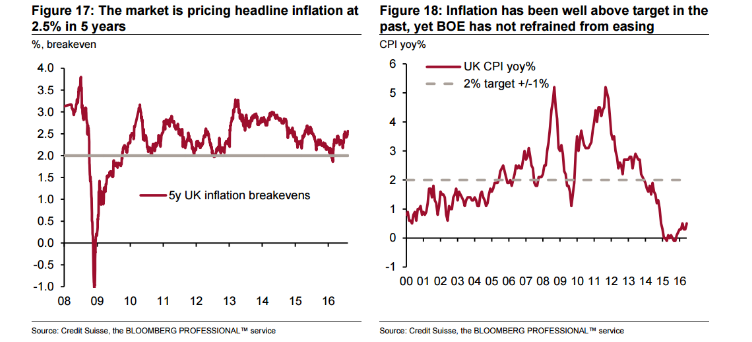- Analytics
- News and Tools
- Market News
- GBP: 10 Reason Why Negative Rates Could Happen In The UK - Credit Suisse
GBP: 10 Reason Why Negative Rates Could Happen In The UK - Credit Suisse
"We identify 10 reasons why negative rates could end up happening in the UK:
1. The UK economy has simply become much less predictable now to rule any option out: Most economists see a quick, shallow recession - yet Carney himself admitted last week that there is no perfect way to 'model' the UK economy post-Brexit. Even McCafferty said he "prefers to learn as we go, providing some stimulus while using our available ammunition cautiously."
2. 'Never' is a temporary concept for central banks. What is deemed appropriate and effective in 'exceptional' policy has fluctuated as conditions surprise in an 'exceptional' way too. In 2010 ECB QE/corporate bond buying was unfeasible. In 2015 the MPC was adamant the next UK rate move would be higher; not an ultra-dovish cut with QE. Kuroda shunned negative rates in Japan just days before BOJ cut negative.
3. The MPC may be trying to rein in expectations at the moment. The MPC knows many central banks that provided too honest a forward guidance recently have suffered from disappointing markets later (e.g. ECB in December 2015, BOJ in January and Riksbank in February). We believe part of the reason why a shrewd Bank of England may want to appear so shut to even discussing negative rates may just be to avoid fueling market expectations - especially before Brexit effects become clear.
4. Negative rates can be 'designed' to be less painful. NIRP is not 'one size fits all'. Theoretically, schemes can be tailored to disproportionately attribute effects among agents, depending upon desired and undesired side effects. The SNB's negative sight deposit rate only applies to entities that hold deposits over a high exemption threshold.
5. Rate cuts seem to be a 'powerful' tool in the UK: Some structural factors about the UK economy suggest to us that interest rates have a faster and cleaner transmission to households than in other places.
6. QE may reach problems sooner than expected: As detailed in the macro section earlier, market size and operational limits of UK QE are already becoming apparent just two days into purchases.
7. High headline inflation need not exclude further rate cuts: Negative rates may be seen as a useful tool for such a 'deflation' setup (e.g., by Riksbank, ECB, BOJ).
8. Can fiscal easing 'permanently fill the slack' in the longer term? November's UK Autumn Statement is widely expected to mark a shift from current austerity. ...If fiscal policy no longer takes the pinch, BOE may have little option but to eventually fill the gap. PM Theresa May has so far welcomed higher spending, but we question the true political appetite of creating a legacy defined by deep budget deficits.
9. Negative rates may just accelerate the UK's rebalancing: Negative rates in Switzerland/Japan were intended to prevent currency appreciation due to excessive capital inflows. This context differs from the UK - where the natural trend for GBP is already skewed to depreciation, and where there is the reverse problem of attracting inflows to fund the still large, sticky current account deficit. .
10. If all other options seem exhausted, the BOE may need to send a dovish signal: If the UK's recession is deeper and longer than expected, the BOE may simply have few options but to open the door to further easing. It is unclear what would be more damaging for investor confidence- refraining from negative rates due to bank profitability concerns, or signaling that the central bank has run out of options. Negative rates may even be less awkward than other measures - e.g., FX interventions are frowned upon by the US Treasury.
Conclusion: We believe the arguments we make above for negative rates are still outweighed by the ample and well-understood reasons against negative rates in the UK. But the debate is certainly not as straightforward or binary as the BOE has made it to sound this week. The situation is simply too fluid for never saying never".
Copyright © 2016 Credit Suisse, eFXnews™
© 2000-2026. All rights reserved.
This site is managed by Teletrade D.J. LLC 2351 LLC 2022 (Euro House, Richmond Hill Road, Kingstown, VC0100, St. Vincent and the Grenadines).
The information on this website is for informational purposes only and does not constitute any investment advice.
The company does not serve or provide services to customers who are residents of the US, Canada, Iran, The Democratic People's Republic of Korea, Yemen and FATF blacklisted countries.
Making transactions on financial markets with marginal financial instruments opens up wide possibilities and allows investors who are willing to take risks to earn high profits, carrying a potentially high risk of losses at the same time. Therefore you should responsibly approach the issue of choosing the appropriate investment strategy, taking the available resources into account, before starting trading.
Use of the information: full or partial use of materials from this website must always be referenced to TeleTrade as the source of information. Use of the materials on the Internet must be accompanied by a hyperlink to teletrade.org. Automatic import of materials and information from this website is prohibited.
Please contact our PR department if you have any questions or need assistance at pr@teletrade.global.
















